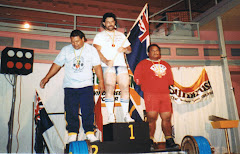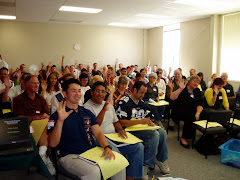The title speaks for its self, doesn't it?
How good are you at breaking the rules? How good are you at challenging what has always been done? So often I find myself amazed at how many organisations are still doing what they have  always done. Not ever challenging why they do what they do or even consider the possibility, that things can and could be done in a better, more innovative way.
always done. Not ever challenging why they do what they do or even consider the possibility, that things can and could be done in a better, more innovative way.
 always done. Not ever challenging why they do what they do or even consider the possibility, that things can and could be done in a better, more innovative way.
always done. Not ever challenging why they do what they do or even consider the possibility, that things can and could be done in a better, more innovative way.The rigidity found in systematising a process, be it in a thriving business, in training and development or a coaching methodology, in my opinion, destroys the long term potential for progress and success.
Temporay Solution
Initially it appears innocent, to formalise a process, even benchmark it and standardise it. Initially all those involved support the establishing of rules or guidelines that provide a sense of direction and sequencing of steps to the job being undertaken. It even brings about a sense of unity among those who agree that this is how we will do things i.e. customer service, a coaching processes, training delivery techniques, HR performance management etc...
Doing this also brings a sense of comfort and security to the group or staff involved and everyone gains the understanding that we are all "...singing from the same choir sheet". At first glance it all looks great! But things are often not as they appear.
The Problem
The formalising and cementing of "due process" immediately eliminates the possibility of being able to operate outside of that framework. While the framework was designed to help and support the business or it's customers. It also cuts off the possibility of assisting those that fall outside of it.
I come across this mentality on a near, daily basis (where process over rules service) and one recent example comes to mind. On Monday evening this week, Lena and I were at a Roast dinner Shop and I ordered a roast pork dinner. I asked the person serving me, if I could buy some additional crackling (crispy, roast pork skin - yummy!) and I was told that they don't sell the crackling separately! Was I a satisfied customer? - NO! (I was clearly outside of the acceptable rules put in place for the businesses effectiveness, but NOT for the customer's satisfaction!).
Look for these examples throughout your day, and you will find many to choose from.
Education is one that comes to mind, where the student is to learn at a speed and rate that has been agreed on for the age of the child, by the educational sector. If you your child doesn't fit the process they have set, then your child is classified as a poor learner and may now require special attention. Mental Health is yet another example, you are to fit into the DSMIV manual or a similar diagnosis tool, and if you do not, then you are the problem, not the system of diagnosis being used. And if you do not respond to the treatment or clinical therapy offered, well... you most definitely are at fault!
Let's go for another, while I am on a role. Training delivery and coaching organisations that have a specific model or models they base their certification on. It will likely be established on credible research and proven to be an effective method of delivering training or providing coaching. It will also be endorsed by the "leaders" in the field as being of great value further supported by testimonials of very satisfied clients. (must be good then...)
So what's the problem? That's easy for me to explain, and much harder for those groups to accept the message I have for them. The very methods they use to define their certification and the way training is to be delivered (learning styles is 1) or coaching is to be performed. Eliminates the freedom to challenge, change or consider new approaches, as it falls outside of the agreed and accepted models that now define that profession.
The process originally used to define the group and position themselves into a niche market, has now become a prison for them. While initially offering security and safety, it also locks out change and progress, because it challenges the hard earned status quo they have fought so hard to establish (we can't allow that now can we!).
History is littered with the martyrdom of men and women who were labelled as heretics or maveriks because they challenged the current accepeted way things were done. In the old days they were burnt at the stake, recieved wipings, hung by the neck and left to die or drowned. Today these people are ostricised from the corporate in-crowd, lambasted corporately via emails, trialled by management and the HR department and dimissed from their position, or similar.
Wanted - More Mavericks!
For long term continued progress we must eveluate the relevance of what we are doing, not accepting the models that define the profession as being fixed in stone and to be fought over to the death to ensure they are kept sacred for the many years ahead. We need to have the flexibility to consider change that was never considered before. We need to embrace the possibility that there are newer and better ways to do what we do and have done so, for far too long.
- Learn the rules to break the rules!
- Challenge what is accepted as an effective means to do what you do!
- Consider the possibility of "what if we are wrong about this...?"
- Entertain the idea of a new approach that may be the opposite to what has always been done!
Are you willing to be a maverik of a sort? To look at what has always been done and consider is that true in all situations? Could it be, that what we consider unacceptable practice, is in fact an opportunity to make new advancements in our porfession.
Conformity and uniformity is the death of long term progress and innovation. Change or die is the message being hearalded to all businesses and professions.
May we always celebrate those who say they "...see things and wonder why, when others see things and say - why not!
Footnote:
The NLP & NS communities need to be aware of the dangers of formalising their processes. And the part it plays in destroying the long term advancements that can be made through continued progress and evaluation. Remember Ashley's Law of Requisite Variety?



















































No comments:
Post a Comment